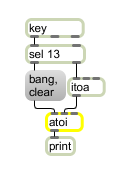Examples

Convert ASCII characters to integers
| bang | In left inlet: a message can be used to trigger the output of the currently stored numerical list. A in the right two inlets is treated as a symbol. | |
| int | input [int] |
In left inlet: The ASCII value of each of the digits of the number is stored internally and sent out the outlet as a list. |
| float | input [float] |
In left inlet: The ASCII value of each of the digits of the number is stored internally and sent out the outlet as a list. |
| list | input [list] |
Each int in the list is converted to ASCII as described above, and a space character (ASCII value 32) is inserted between items in the list. The middle inlet is used to append to the currently stored list, and the right inlet will set the contents of the internally stored list, without causing output. |
| anything | input [list] |
In left inlet: The ASCII value of each letter, digit, or other character in the symbol is stored internally and sent out the outlet as a list. In middle inlet: The ASCII value of each letter, digit, or other character in the symbol is appended to the currently stored list. No output is triggered. In right inlet: The ASCII value of each letter, digit, or other character in the symbol is stored internally, replacing the previously stored list, but not output. |
| clear | In left inlet: The message is used to clear the contents of the internally-stored numerical list. The word in the right two inlets is treated as a symbol. |

| Name | Description |
|---|---|
| itoa | Convert integers to ASCII characters |
| key | Report key presses on the computer keyboard |
| keyup | Report key releases on the computer keyboard |
| message | Send any message |
| regexp | Use PERL-style regular expressions to process input |
| spell | Convert input to ASCII codes |
| sprintf | Format a message of words and numbers |